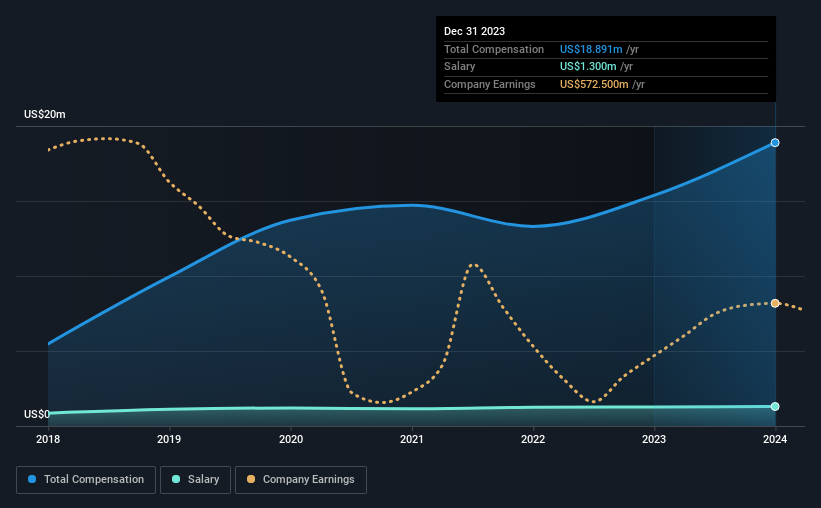Key Insights
-
Lear will host its Annual General Meeting on 16th of May
-
Salary of US$1.30m is part of CEO Ray Scott’s total remuneration
-
The overall pay is 166% above the industry average
-
Lear’s EPS grew by 26% over the past three years while total shareholder loss over the past three years was 25%
The underwhelming share price performance of Lear Corporation (NYSE:LEA) in the past three years would have disappointed many shareholders. Despite positive EPS growth in the past few years, the share price hasn’t tracked the fundamental performance of the company. The AGM coming up on the 16th of May could be an opportunity for shareholders to bring these concerns to the board’s attention. They could also try to influence management and firm direction through voting on resolutions such as executive remuneration and other company matters. We discuss below why we think shareholders should be cautious of approving a raise for the CEO at the moment.
View our latest analysis for Lear
Comparing Lear Corporation’s CEO Compensation With The Industry
Our data indicates that Lear Corporation has a market capitalization of US$7.3b, and total annual CEO compensation was reported as US$19m for the year to December 2023. We note that’s an increase of 23% above last year. While we always look at total compensation first, our analysis shows that the salary component is less, at US$1.3m.
On comparing similar companies from the American Auto Components industry with market caps ranging from US$4.0b to US$12b, we found that the median CEO total compensation was US$7.1m. This suggests that Ray Scott is paid more than the median for the industry. What’s more, Ray Scott holds US$1.8m worth of shares in the company in their own name.
|
Component |
2023 |
2022 |
Proportion (2023) |
|
Salary |
US$1.3m |
US$1.3m |
7% |
|
Other |
US$18m |
US$14m |
93% |
|
Total Compensation |
US$19m |
US$15m |
100% |
Speaking on an industry level, nearly 13% of total compensation represents salary, while the remainder of 87% is other remuneration. It’s interesting to note that Lear allocates a smaller portion of compensation to salary in comparison to the broader industry. It’s important to note that a slant towards non-salary compensation suggests that total pay is tied to the company’s performance.
A Look at Lear Corporation’s Growth Numbers
Lear Corporation has seen its earnings per share (EPS) increase by 26% a year over the past three years. It achieved revenue growth of 9.8% over the last year.
Overall this is a positive result for shareholders, showing that the company has improved in recent years. It’s also good to see modest revenue growth, suggesting the underlying business is healthy. Moving away from current form for a second, it could be important to check this free visual depiction of what analysts expect for the future.
Has Lear Corporation Been A Good Investment?
Since shareholders would have lost about 25% over three years, some Lear Corporation investors would surely be feeling negative emotions. Therefore, it might be upsetting for shareholders if the CEO were paid generously.
To Conclude…
The fact that shareholders are sitting on a loss on the value of their shares in the past few years is certainly disconcerting. The fact that the stock price hasn’t grown along with earnings may indicate that other issues may be affecting that stock. Shareholders would be keen to know what’s holding the stock back when earnings have grown. At the upcoming AGM, shareholders will get the opportunity to discuss any issues with the board, including those related to CEO remuneration and assess if the board’s plan will likely improve performance in the future.
CEO compensation is a crucial aspect to keep your eyes on but investors also need to keep their eyes open for other issues related to business performance. That’s why we did some digging and identified 1 warning sign for Lear that investors should think about before committing capital to this stock.
Of course, you might find a fantastic investment by looking at a different set of stocks. So take a peek at this free list of interesting companies.
Have feedback on this article? Concerned about the content? Get in touch with us directly. Alternatively, email editorial-team (at) simplywallst.com.
This article by Simply Wall St is general in nature. We provide commentary based on historical data and analyst forecasts only using an unbiased methodology and our articles are not intended to be financial advice. It does not constitute a recommendation to buy or sell any stock, and does not take account of your objectives, or your financial situation. We aim to bring you long-term focused analysis driven by fundamental data. Note that our analysis may not factor in the latest price-sensitive company announcements or qualitative material. Simply Wall St has no position in any stocks mentioned.
